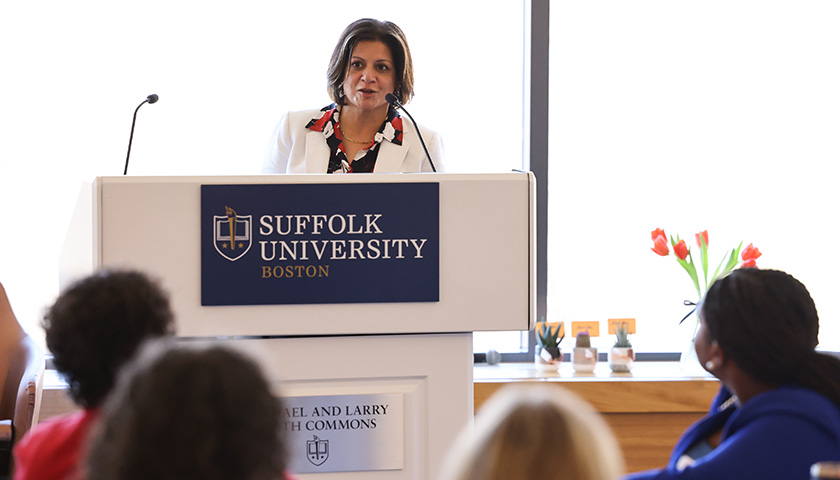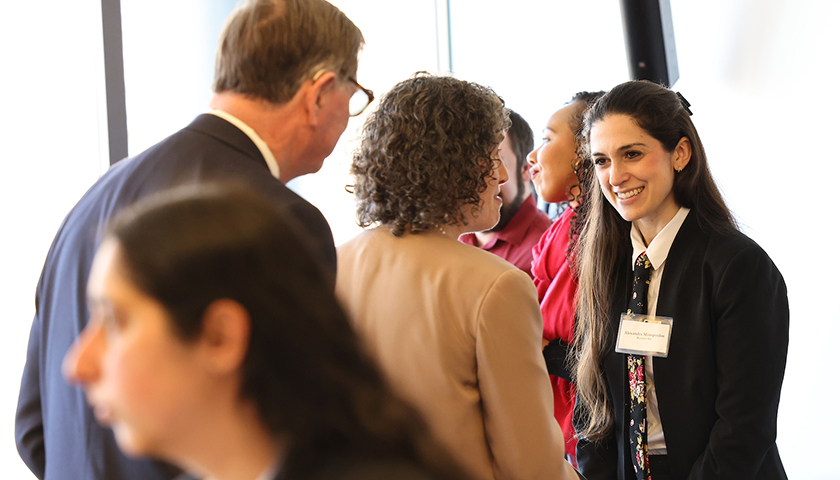Summit Tackles Law Student Well-Being Challenges Head On
On April 26, the Legal Education Subcommittee of the Massachusetts Supreme Judicial Court’s Standing Committee on Lawyer Well-Being held what may be a first-of-its-kind strategy session to help tackle the problem: The 2024 Law School Well-Being Summit. Read coverage in Lawyer's Weekly.

At the Summit, Heidi Alexander, Director of Lawyer Well-Being at the Massachusetts Supreme Judicial Court (SJC), the SJC Legal Education Subcommittee (LES), and LES co-chair Suffolk Law Professor Shailini George, brought together:
- Leaders of 11 state bar associations, including the Board of Bar Overseers
- Administrators from all nine law schools in Massachusetts
- Faculty, students and mental health professionals

Massachusetts Appeals Court Justice Kathryn Hand set the stage for the Well-Being Summit discussion, noting that many student respondents to the SJC’s 2019 survey on wellbeing reported stress resulting from the financial pressures of paying for their legal education, as well as depression, anxiety and substance misuse concerns. Due to the stigma of mental health issues, many of the same students expressed reluctance to seek treatment, she said.
“The good news is that the [report’s] message is being heard and the fact that you're here is proof of that. This Summit is proof of that,” she said.
Stacey Best, executive director of Lawyers Concerned for Lawyers (LCL), moderated a session with Barbara Bowe, a social worker and clinician who works with Best at LCL, and Julie Cahill, University of Massachusetts School of Law Assistant Dean of Students.
Best asked how the role of legal educator has changed in the context of student well-being. Cahill and Bowe both agreed that legal education is more of a “team sport” presently, with administrators, staff, and faculty working together to address student mental health needs.
Cahill and Bowe mentioned modeling for students that it’s okay to ask for help, sometimes turning to other experts, in front of the students, for opinions and advice. That trains students how to martial the resources they need, they said.
In his remarks at the event, Suffolk Law Dean Andrew Perlman noted that the wide attendance at the Summit was a good sign that improving student mental health was becoming an increasingly important priority. In addition to its one-credit class on well-being, Perlman said, the school has also added a credit to its required professional responsibility course, which will allow for coverage of student well-being topics.
Breakout sessions on specific well-being topics were led by Suffolk faculty: Professor Sarah Schendel on accessibility, Professor Lisle Baker on well-being in the curriculum, and Dean of Students Ann Santos on accommodations. The mix of different stakeholders present to discuss mental health topics was part of the event’s unique character.
“Law Warrior” culture
Professor George, an expert on law student wellbeing and author of The Law Student’s Guide to Doing Well and Being Well (Carolina Academic Press 2021), is a national voice arguing that law firms and law schools should promote a “wellbeing culture” rather than a “law warrior” culture. The latter puts a premium on working very long hours and showing a minimum of vulnerability.
Solutions to the law student well-being problem should be undertaken not in one-off chair massage or yoga sessions or even a “wellness week,” at a law school, but consistently, and in a more holistic way that involves multiple stakeholders, including law firms, George argues.
In 2021—in partnership with her colleague Professor R. Lisle Baker, an authority on the principles of positive psychology—Professor George launched a one-credit course on thriving in law school that uses her book as a touchstone.
Her students appreciate the book’s unorthodox subject matter, including practical mindfulness techniques that separate students from their phones when they’re studying; time management strategies that honor the primacy of regular study breaks and exercise; and recalibrated definitions of what it means to succeed in law school.
What does the neuroscience research say?
George says the time-honored image of a diligent law student groggily pushing onward into the wee hours doesn’t jibe well with her neuroscience research. Those late-night cram sessions are generally fruitless. Better, instead, to work in shorter bursts of about 50 minutes, starting with writing down clear and detailed goals for your study session and a few minutes of deep breathing. She also recommends something counterintuitive for most law students: setting a time to stop working.
It’s important to give the brain true rest time, she says, because it’s during such interludes that the brain processes information, makes connections, and discovers solutions.
Changing law firm culture
George argues that law firms aren’t doing enough to address lawyer burnout. She offers a few ways that law firm leaders can change the dynamic.
In a profession where working overtime tends to be seen as “a badge of honor,” George says that attorneys with direct reports need to stop valorizing emotionally punishing work schedules and begin modeling better self-care. She also calls for laying out clearer definitions of work emergencies so that inexperienced attorneys don’t feel the need to be tethered to their phones in the wee hours.
“We know that many lawyers are suffering from mental health issues, burnout, and a general failure to thrive. The overworking tendencies start in law school. A consistent well-being message, beginning in law school and continuing in practice will make those soon-to-be lawyers better equipped to manage their well-being and in turn, better manage their work. That is a win-win for everyone involved.”



